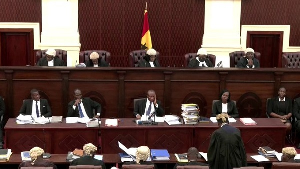Ghanaians now have confidence in the local currency. Last year, there was a substantial growth in the domestic currency deposits’ component of broad money relative to foreign currency deposits.
To that end, the Bank of Ghana (BOG) has assured that it would pursue sound policies that would give confidence to the holding of cedi-denominated assets. The first deputy Governor of the BOG, Mr Emmanuel Asiedu-Mante disclosed this at the third annual Institute of Statistical Social and Economic Research (ISSER) and Merchant Bank economic lecture and roundtable discussion held in Accra on Monday.
He said these efforts would be sustained by encouraging a deepening of the capital market as government borrowing declines and new instruments are introduced on the local bourse. Mr Asiedu-Mante said that government and the Central Bank would deepen their collaboration to ensure that monetary and fiscal policies were coordinated and complemented to deliver a suitable macroeconomic environment for growth.
The country’s macro-economic environment suffered significant turbulence in 1999-2000 with sharp depreciation of the exchange rate, high inflation, and interest rate. Fiscal slippage as a result of an external shock and an accommodating monetary policy resulted in substantial deterioration in macro-economic performance. The government and BOG, therefore on a stabilisation drive which had resulted in remarkable results. Inflation, which peaked at 41.9 per cent in March 2001 has fallen steadily to 16 percent as at the end of March this year.
Mr Asiedu-Mante who spoke on the topic “the Golden Age of Business: The role of the “Banking Sector” conceded that banking sector alone could not address all the problems facing the private sector. He therefore appealed to government to create the right environment for the private sector to strive.
“In this respect, the role of government in creating an enabling environment by investigating in infrastructure, improving the tax and other incentive regimes and establishing long-term sources of funding to support start-up enterprises and re-tooling of existing ones will be beneficial”, he said.
He said that government as a facilitator of business needs to provide the necessary infrastructure efficiently and effectively to reduce the cost of doing business. He suggested the need for government to set aside moneys that accrue from the National Reconstruction and Levy imposed on banks and set up a Venture Capital Fund which could be used to assist export oriented start-ups and micro enterprises.
Click to view details



Business News of Wednesday, 17 April 2002
Source:
















